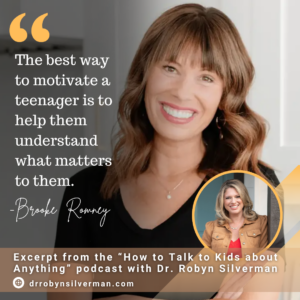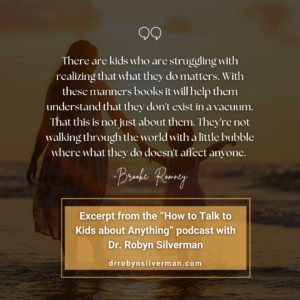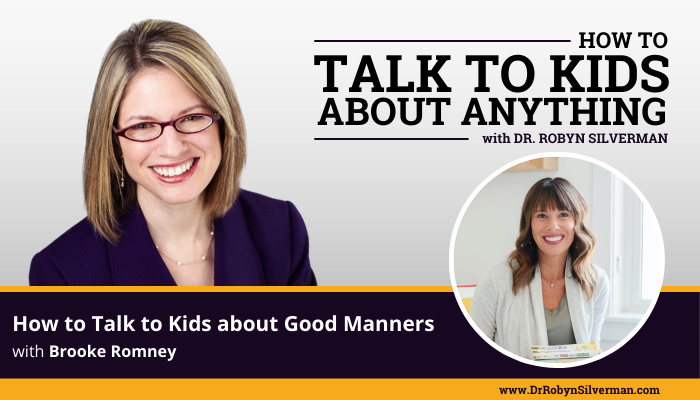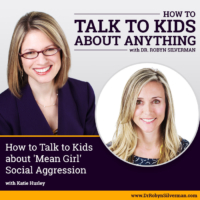Podcast: Play in new window | Download
Subscribe: Apple Podcasts | RSS | More
How to Talk to Kids about Good Manners
This podcast episode explores the significance of teaching children about good manners and helping them understand the value of respect. Dr. Robyn interviews Brooke Romney, a bestselling author, to delve into these important topics.
INTRODUCTION:
A constant question I receive from my listeners and followers are about teaching kids respect—and given that we came out of the holiday season not too long ago, it’s not surprising that respect—and more specifically, manners, has been on parents’ minds. When kids are at home, we often let things slide, but when kids are in front of family or out in public, we often focus on the manners we want them to showcase. Holding the door for others, saying please and thank you, speaking at a volume that makes sense for the place you are in, being a good host and so much more. As children become teens manners become that much more important as we are truly preparing them for becoming a thriving adult who does good things in the world. Interviewing well, making a good impression, advocating for yourself without bragging, watching their language, being a good friend who avoids gossiping and shows up when they are supposed to do so. How do we talk to kids about good manners and leaving bad manners behind? For that, we are inviting my next guest, Brooke Romney, to the show.
Bio:
As a mom to four boys, Brooke Romney recognized that something had to change in our approach to connecting with our kids and teaching them everything they need to know before they leave the nest. In 2021, she published the first book in her 52 Modern Manners series, 52 Modern Manners for Today’s Teens Volume 1. With more than 100k copies sold, the book, and the subsequent 52 Modern Manners for Today’s Teens Volume 2 and 52 Modern Manners for Kids, guide parents to teach more modern and nuanced manners to their kids that will help them find success and fulfillment in relationships, school, work, and life.
Important Messages:
-
 Starting Manners Early: the earlier, the better. The Kids’ Manners book really can start about age four, but on the opposite side, it’s never too late.
Starting Manners Early: the earlier, the better. The Kids’ Manners book really can start about age four, but on the opposite side, it’s never too late.- Top Manners to Teach: the most important manner for a family is the one that you need the most at the moment. But being more general the first manner in the book for kids, I think is the one that is a pain point for many parents. And it’s wait for your turn to talk. Which is about not interrupting.
- Volume 1 & 2 – Modern Manners for Teens:
- Importance of Online Privacy.The manner in there for me that is crucial for our teenagers to learn right away is that nothing online is private. If they can understand that technology manner, they will have a much easier time with technology, which is going to be forefront in their lives.
- Respect for Others’ Homes:respect people’s homes, sometimes teens will balk at that and think like, oh, that’s just annoying. But actually that gets you invited back to those places you want to go.
- Reading the Room: This is a little bit more of a mature manner, but one that can be very helpful from the time they’re ready for it to adulthood.
- Additional note from Dr. Robyn:
Respect: Teaching kids for me they, there’s different powerful words of the month, whether it’s respect or kindness or open-mindedness, discipline, you know, sportsmanship, they’re, they’re all over the place. And the, the word respect really gets weaved into a lot of different areas of our lives. We have what we talked about, you know, at home where we’re at the dinner table, or there’s things that happen at school, there’s things that happen on the sports field, there’s things that happen with friends. It’s something that’s so important.
- Waiting for Their Turn to Talk: Giving them the option of saying like, excuse me, please, if something’s important.
- Grateful standpoint or response:Hey, today I was on the phone and I knew you needed my attention, and you were so great at waiting until I was finished with that phone call. These are, it’s just a place to start and then you can infuse your own personal values, your own family values into those conversations.
- Nuances of Interruptions:From the Let’s Practice section of the Kid’s Manner Book, say for example playing outside, your mom is talking with your neighbor. You just saw your sister fall off her bike and she is hurt. Your mom didn’t see it. That helps them understand there are times when interrupting is important and necessary. The way it kind of gets a conversation started and allows them to think about it. As parents, when we teach in complete black and white, it leaves our children wondering, wait, so I can never interrupt, or sometimes I can, and I, I want to make it more clear and begin a conversation. So if there’s something that’s going on in your family, let’s say your child is getting ready for their soccer game and they don’t know which color of uniform to wear, but you’re on the phone with a parent, but they know they have to leave in five minutes, that’s gonna be a little trickier situation where they may need to hold that note up or do a little signal to get your attention so they can be ready when it’s time to be ready.
- Additional note from Dr. Robyn:
Leave room for interpretation:It is really important that we leave room for interpretation because certain things may be more important to one parent than to another. And there is room for interpretation on understanding that then when you go to somebody else house, things might be different.
-
- Adaptability and Courtesy: as a family, we are a more casual family overall. We allow kids to go into the pantry and grab snacks for themselves. We are open with like someone laying on our couch. As teens started to enter the homes of other people who had different expectations, you don’t want them to be seen as someone who wasn’t welcome or wasn’t polite or didn’t understand how to interact well with that family. If someone says, Hey, feel free to grab a snack anytime you want to, it’s still polite to ask if they’re there.
- Most Polite Option:having the most polite option in their mind allows them to be someone that can easily adapt to any situation. When kids feel where they’re no longer welcome or a part of a circle or someone that always gets invited. Not because they’re not a good kid, just because they didn’t know. And so start with the most polite option and then relaxing that with more familiarity.
- Preparing Kids for Tricky Situations: Allowing our kids to get in front of awkward or tricky situations. When they felt equipped to do exactly what you just said, you were just equipping him to understand how to be a good host, what you might need to say, even if you’re not hungry. Those types of things. The manner books spur those conversations. So if a tricky situation happens, or there’s one about advocating for yourself at school. If your teenager comes home and they are so mad because they ended up getting a C instead of a B and they said, well, I should have just talked to my teacher. Well, we’ve already talked about advocating for yourself at school. You can talk to your teacher about something that was not missing, that was marked missing instead of just accepting a grade. Getting our kids in front of that, helping them to have the confidence to be able to do the things because they know what the right action would be in a situation like that before it comes up.
- Accepting Compliments Manner:If you’re someone that’s not comfortable with it, just saying thank you. If they compliment your shirt, you can say, “oh, thanks so much I just barely got it at Target.” You can follow it up with something like that. Being able to just say, thanks so much and, and leave it at that. Sometimes they think they have to say too many things and letting them know that if somebody tells them they had a great game, saying thank you, and if it was someone that they were playing with, they can say, thanks, you played great too. That is helpful. Or if it was an adult and their child was also in the play, they could say, thanks so much. Sometimes that can help deflect. Sometimes it’s just they’re not comfortable with so much energy on them. So just being able to deflect that and also be kind in the process.
- Respond with another compliment: The other thing that I’ve found that feels really comfortable, is if someone says something kind to me like, “I really love your shirt, oh, thank you so much, I appreciate you noticing”, you know, following it up with, “that was so kind of you to say.” When you’re generous about giving compliments, sometimes it feels a little less awkward to accept them because you understand what someone is saying and the spirit that they’re saying it in.
- Being Careful on Comparison: It might bother somebody if you walked up to somebody and said, my child is so kind. But when they said, “wow, you know, like, your son is so kind, thank you”, or something, like, “we really enjoy that trait about him that has really helped our family, his kindness has been a great example to his brothers.” Sometimes people get a little bit worried that they’re gonna say, well, my life’s the best, and nothing ever goes wrong, and we’re so lucky. But there’s great ways to be sensitive, but also to, to take that compliment.
- Do your Part Manner: There are kids who are struggling with realizing that what they do matters. With these manners books it will help them understand that they don’t exist in a vacuum. That this is not just about them. They’re not walking through the world with a little bubble where what they do doesn’t affect anyone.
- Preparation for life: And so understanding that manner but it’s also a great preparation for life because we’ve all been employees where others are not doing their part. On the flip side of this manner, helping them understand that they will all be responsible for the grade that comes. So if it matters to you because you care about an A and your friend only cares about a C, he’s going to do a C amount of work. If you want the A, you will probably have to make up from his C to an A. And is that fair? No. Is that life? Yes.
- Life is a group project:From the time you’re little to the time you go, you’re gonna be in a home where, or have a roommate or something like that, where getting the dishes done right away does not matter to them. So if it matters to you, you’re probably gonna be the one that does the dishes more often than the one who doesn’t care about it. But if everyone can get in their mind, do your part from a young age, perhaps that person will give a little more effort to get the dishes done because it matters to someone else too.
Notable Quotables:
 Notable quotables:
Notable quotables:
- The manner for me that is crucial for our teenagers to learn right away is that nothing online is private. If they can understand that technology manner, they will have a much easier time with technology, which is going to be forefront in their lives.
- As parents, when we teach in complete black and white, it leaves our children wondering, wait, so I can never interrupt, or sometimes I can, and I, I want to make it more clear and begin a conversation. So if there’s something that’s going on in your family, let’s say your child is getting ready for their soccer game and they don’t know which color of uniform to wear, but you’re on the phone with a parent, but they know they have to leave in five minutes, that’s gonna be a little trickier situation where they may need to hold that note up or do a little signal to get your attention so they can be ready when it’s time to be ready.
- lWhen you’re generous about giving compliments, sometimes it feels a little less awkward to accept them because you understand what someone is saying and the spirit that they’re saying it in.
- There are kids who are struggling with realizing that what they do matters. With these manners books it will help them understand that they don’t exist in a vacuum. That this is not just about them. They’re not walking through the world with a little bubble where what they do doesn’t affect anyone.
- Because while we would love for everyone to be motivated by something higher, the best way to motivate a teenager is to help them understand what matters to them.
- The manner says the people that are physically with you are more important than what is on your screen.
- a parent would not feel safe with a teenager coming over that was going to expose younger kids to things that she’s not ready for them to be exposed to. And I think with the manners, especially for teens one of the things that was important to me on the back of each manner was helping them understand what’s in this for you.
- Phones and technology are a very big part of our life, and it takes extreme amounts of discipline. But what I’ve seen, I’ve got older kids that are past the teenage years even, is the people that can figure out how to have real relationships as young as possible are the ones who end up enjoying life the most.
Resources:
- Website: https://brookeromney.com/
- Books:
- 2023: 52 Modern Manners for Kids
- 2022: 52 Modern Manners for Today’s Teens – Volume
- 2022: 52 Modern Manners for Today’s Teens – Volume 2
- 2020: I like Me Better Anyway: Embracing Imperfection, Connection & Christ
- Amazon link: https://www.amazon.com/Brooke-Romney/e/B08L8WQN6C
- Pinterest: https://www.pinterest.com/brookeromneywrites/
- Facebook: https://www.facebook.com/brookeromneywrites/
- Instagram: https://www.instagram.com/brookeromneywrites/?hl=en
- Twitter: https://twitter.com/brookeoromney









